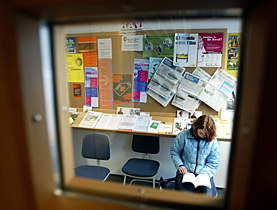Swiss plot escape from economic doldrums

As Switzerland reflects on a bruising 12 months for its economy, the wheels are already in motion to chart a course to better times starting in 2010.
Unemployment is set to rise next year and the financial sector still faces uncertainty. But economists believe the structural strengths that protected Switzerland from the worst of the recession will aid recovery.
Economic output declined 1.6 per cent in 2009, according to government figures, as financial giants bore the pain of past misjudgments and the export-driven manufacturing industry saw international markets dry up.
The umbrella group of the Swiss mechanical and electrical engineering sectors, Swissmem, said exports were down 23 per cent in the first half of the year compared with 2008 and that new orders had also slumped by more than a third.
As a result, unemployment is likely to peak at around five per cent next year, according to forecasters.
Big manufacturing companies such as Sulzer and Georg Fischer have been hit particularly hard, while technology concern Oerlikon was forced to present a financial restructuring plan to its creditors in December.
Drugs profitable
Practically the only Swiss sector to keep its head above water in 2009 was the pharmaceutical industry led by Roche that profited from sales of its anti-viral drug Tamiflu which is used in the fight against swine flu.
Swiss banking giant, UBS, is still tottering from the subprime mortgage debacle and a damaging legal case in the United States over tax evasion. The bank reported a fourth successive quarterly loss in November – this time of SFr564 million ($538 million).
The entire Swiss banking and wealth management industry is preparing itself for a regulatory clampdown beyond international standards to limit risk taking. The sector is also facing the prospect of losing European and US assets as measures are introduced to stop tax evaders parking their wealth in Switzerland.
However, many observers can still find some cause for optimism in the midst of this depressing picture. The financial crisis appears to have largely run its course and Switzerland has retained some semblance of economic stability compared to many other countries.
The Swiss National Bank (SNB) has won plaudits for dropping interest rates to virtually zero and for keeping the currency on an even keel. Consumer sentiment has somehow remained stable enough to buoy the domestic economy while the steady housing market has successfully resisted the boom and bust cycle that has bedeviled other nations.
Only one bank – UBS – needed a government bail-out, and while the SNB still has billions of dollars in toxic assets on its hands, UBS has paid off its taxpayer sponsored overdraft.
Debt contained
The economy as a whole has also needed relatively little government financial stimulus to keep it afloat when compared with other countries. The result has been to keep national debt under control, while the state recently announced annual savings of SFr1.5 billion for the next few years in an effort to balance the books further.
But forecasting the course of the economy has proved to be a business fraught with difficulties over the last two years. While government economists have predicted a 1.6 per cent shrinkage of gross domestic product (GDP) this year, the Swiss Economic Institute (KOF) believed in September -3.4 per cent was more realistic (but this was revised to -2.9 per cent in December).
Some economists are wary about the effect on Swiss exporters of international stimulus packages drying up over the course of 2010. This may presage a “double dip” economic downturn – meaning a further fall in the course of the next 12 months – they fear.
World renowned investor and author Nicholas Taleb presented a stark warning about the state of the global economy during a visit to Zurich. Taleb, one of the few people to openly predict the financial crash, predicted an impending round of hyperinflation and warned that other countries could follow Dubai into a debt-related crisis some time soon.
His speech echoed the fears of many economists that Switzerland is precariously vulnerable to the state of the world economy. Switzerland may be keeping its house in better order than many countries, but it is still highly susceptible to catching a cold if someone sneezes on the other side of the globe.
Matthew Allen, swissinfo.ch
The State Secretariat for Economic Affairs (Seco) believes the Swiss economy will contract by 1.6% in 2009 and recover with 0.7% growth next year, rising to 2% in 2011.
KOF is of the opinion that GDP will decline 2.9% this year and will start growing from 2010 (0.6%) and then record 2% growth in 2011.
UBS has forecast -1.5% GDP change for 2009, rising to a positive 1.7% reading in 2010 and 2.1% in 2011.
Economic forecasters BAK Basel have also revised their estimates upwards, now forecasting a 1.7% decline in Swiss GDP for this year and growth of 0.7% in 2010.
All economists agree that unemployment will peak at around 5% next year or early in 2011.

In compliance with the JTI standards
More: SWI swissinfo.ch certified by the Journalism Trust Initiative











You can find an overview of ongoing debates with our journalists here . Please join us!
If you want to start a conversation about a topic raised in this article or want to report factual errors, email us at english@swissinfo.ch.